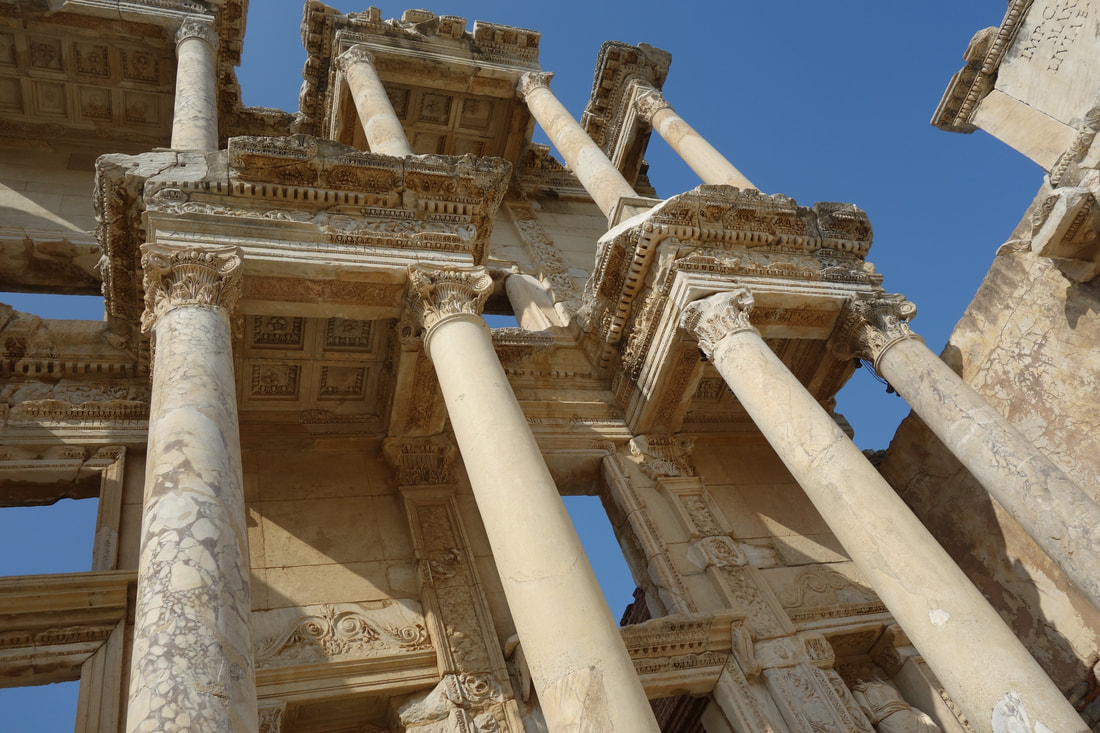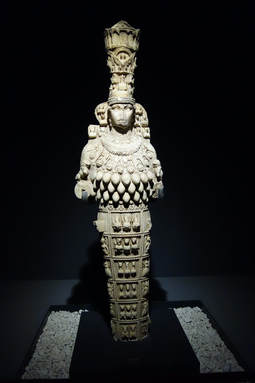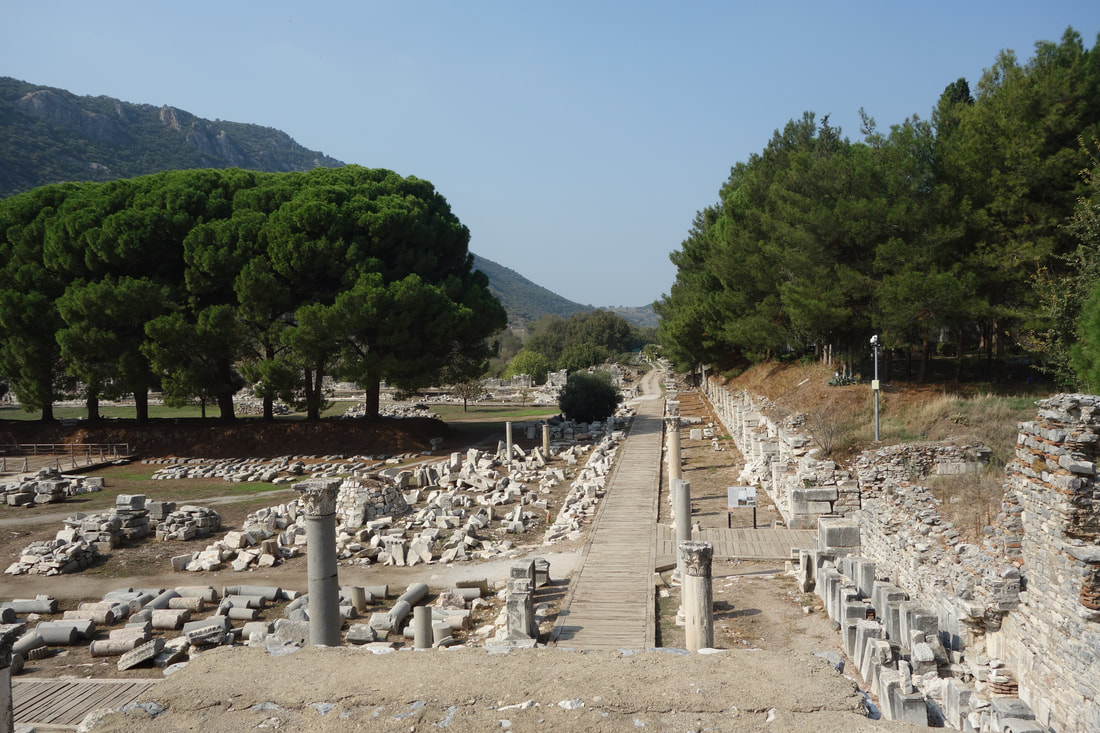|
Timothy W. Berrey is the Director of Graduate Studies at BJMBC. In 2018, Tim Berrey led the BJMBC Footsteps of John and Paul Study Tour to Turkey and Greece. The following is an excerpt from the Footsteps of John and Paul devotional book. EPHESUSAncient Ephesus was a city dear to both John and Paul. Paul labored here first and, in fact, visited the city on multiple occasions. Even as early as his second missionary journey, when he directed Aquila and Priscilla to take up residence there, he seems to have felt it God’s will for him to minister there at some point in the future. Almost three years of his third missionary journey were devoted to preaching Christ in Ephesus and only the riot in the nearby amphitheater convinced him the time had come for him to move on. However, the “damage” (so to speak) had been done. Before he left, “all Asia had heard the word of the Lord Jesus” (Acts 19:10). Even after he left Ephesus, he remained burdened for the church and wrote them an epistle preserved in our Bibles as his “Letter to the Ephesians.” The courier of his letter was none other than Tychicus, an Asian believer who was probably from Ephesus and likely a convert of the Apostle Paul. Paul’s personal footprint in the city was further extended by the ministry of Timothy, his closest son in the faith, whom he personally requested to help the church to stand against some who were teaching false doctrines (1 Tim. 1:3-4). Church tradition consistently affirms that Ephesus later became the headquarters of the Apostle John’s ministry in the Roman province of Asia, much of which he seems to have traveled, overseeing churches and encouraging believers. Ephesus was home to the Temple of Artemis (Diana), one of the seven wonders of the ancient world. This huge structure was four times the size of the Parthenon in Athens and was revered by many in Asia as the chief place of worship to the goddess Artemis. As Paul, in his letter to the Ephesians, speaks of their spiritual “rags-to-riches” story, he climaxes by pointing out that the church, the “new man” composed of both Jews and Gentiles, is actually being built into a Temple or, in more direct terms, God’s dwelling place. In whom all the building fitly framed together groweth unto an holy temple in the Lord: In whom ye also are builded together for an habitation of God through the Spirit (Ephesians 2:21-22). How ironic this must have been to the Ephesian church. They—not the nearby Temple to Diana—were actually the dwelling place of the one true God and could now experience all of His divine fullness. Of course, one cannot think of Ephesus without thinking of Christ’s words to them in Revelation 2, where He censures their faltering love. Nevertheless I have somewhat against thee, because thou hast left thy first love (Rev. 2:4). Strikingly, almost no other New Testament letter of Paul uses the word “love” more than his letter to the Ephesians. Everything we enjoy as believers is because of God’s love for us (Eph. 2:4). He bestows on us so much grace because of our union with His beloved Son (1:6). Rooted and grounded salvifically in His love, we are to go on to experience the infinite dimensions of Christ’s love for us. That Christ may dwell in your hearts by faith; that ye, being rooted and grounded in love, May be able to comprehend with all saints what is the breadth, and length, and depth, and height; And to know the love of Christ, which passeth knowledge, that ye might be filled with all the fulness of God (Eph. 3:17-19). We are then to mimic God’s love by loving others the way He and His Son have loved us (5:1-2). Paul ends his letter by praying grace upon all those who love the Lord Jesus with an undying love. Grace be with all who have undying love for our Lord Jesus Christ (Eph. 6:24; HCSB). The church at Ephesus evidently triumphed over the false teachers of Timothy’s day, but the resurrected Jesus’ comments spoken to the Apostle John reveal something lacking in their love. His criticism reminds us that one can work hard in His name and hate false teaching but do so without the love that He deserves. Hymn for Meditation: Here is Love (William Rees) Here is love, vast as the ocean, Loving-kindness as the flood, When the Prince of Life, our Ransom, Shed for us His precious blood. Who His love will not remember? Who can cease to sing His praise? He can never be forgotten, Throughout heav’n’s eternal days. On the mount of crucifixion, Fountains opened deep and wide; Through the floodgates of God’s mercy Flowed a vast and gracious tide. Grace and love, like mighty rivers, Poured incessant from above, And heav’n’s peace and perfect justice Kissed a guilty world in love. Let me, all Thy love accepting, Love Thee, ever all my days; Let me seek Thy kingdom only, And my life be to Thy praise; Thou alone shalt be my glory, Nothing in the world I see; Thou hast cleansed and sanctified me, Thou Thyself hast set me free. In Thy truth Thou dost direct me By Thy Spirit through Thy Word; And Thy grace my need is meeting, As I trust in Thee, my Lord. Of Thy fullness Thou art pouring Thy great love and pow’r on me, Without measure, full and boundless, Drawing out my heart to Thee.
0 Comments
Leave a Reply. |
BJMBCReading, learning, growing. God calls us to be changed through His Word. At BJMBC, our goal is to speak truthfully and clearly about that Word, while we prepare a future generation of students to proclaim it. Archives
August 2020
Categories
All
|
|
Bob Jones Memorial Bible College, 2018
|
125 Matahimik Street, Barangay Central, Diliman, Quezon City, Philippines, 1100
|





 RSS Feed
RSS Feed